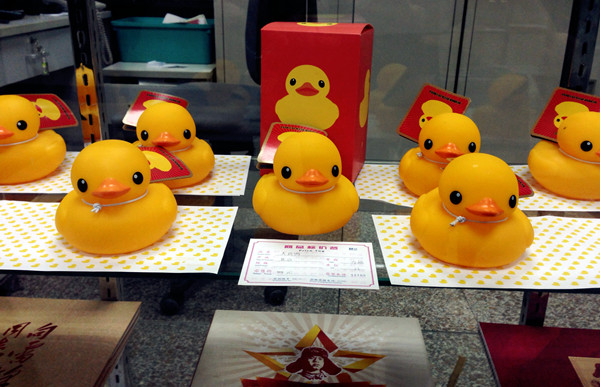The rubber duckie mania
- By Ember Swift
 0 Comment(s)
0 Comment(s) Print
Print E-mail China.org.cn, November 6, 2013
E-mail China.org.cn, November 6, 2013
The giant yellow rubber duckie that was seen floating on Kunming Lake at Beijing's Summer Palace for one month has now flown away, presumably to somewhere warmer for the winter. Farewell parties for the duck -- the ever-migrating floating installation by Dutch artist Florentijn Hofman -- took place on October 27. It even included an appearance by the internationally famous Chinese actor Jackie Chan. (Incidentally, there is a "Chinese Rubber Duck Club" and Jackie Chan is its president.)
18-meters high, the giant rubber duck conducted a two-legged Chinese tour that included 20 days at Beijing's Garden Expo Park before its appearance at the Summer Palace. The latter tourist destination reported a surge in its attendance levels of more than 30 percent over the National Day or "Golden Week" holiday in early October. Clearly, people had flocked to see its featherless yellow grin.
Perhaps it is the presence of something so Western in such stark contradiction to the traditional Chinese relics at that locale that overwhelmed Chinese people with curiosity. The Summer Palace, by contrast, is a location steeped in complex and often troublesome history. For centuries, it was the immense and sprawling summer home of a singular ruling family, thus representing severe class delineation and elitism.
What's more, it was a site of great contention during the nation's Cultural Revolution during which many of the centuries-old murals and buildings were painted over or destroyed for their representation of the "old ways" and bourgeoisie. The elders today must be shaking their heads at this "rubber duck craze," wondering how society can change so dramatically so quickly.
For most of us who grew up in a Western country, a "rubber duckie" is a symbol of childhood. Made famous by the children's show "Sesame Street," the rubber yellow bath toy is still popular with children today. Anyone born after 1975 can surely hum the "Ernie" character's bath song that accompanied its rise in popularity, "Rubber Duckie, you're the one…" Nevertheless, Chinese people are new to this iconic image, which contributes to the enormous hit-factor of this particular art installation. It was a novelty -- no question.
The artist explains that the rubber duck is meant to bring back people's "fondest childhood memories" and promote the idea of peace rather than war. Presumably, it does so by simply representing something innocent, simple, and optimistic. Yet, since Chinese people did not have this bath toy as part of their childhood culture, what was it that Chinese people found so compelling about this floating, yellow beacon shouting an international message via its permanently painted smile?
This is a time in history when convenience and simplicity are the ruling principles of society. Those able to secure commercial attention and capitalist success through such means are the rulers residing within the walls of their own summer palaces, often in faraway lands. Just look at our numerous gadgets and touch screens, offering vacuum-style worlds of entertainment far away from our surrounding realities. What is one of the largest symbols of simple pleasures these days? An apple with a bite missing, lit up and glowing on the covers of our laptop screens. There is no doubt: simple symbolism sells.
With this rationale, it's no wonder that sales of regular-sized rubber ducks and other duck-related souvenirs have been enormous, even extending to official display cases found in state-controlled post offices. (See picture) Furthermore, park entrance tickets to both Beijing sites reported that this floating sensation was responsible for over US$16.3 million in increased revenue. It is no wonder the government (i.e. the post office) and the VIP of China (i.e. Jackie Chan) have been taken under this rubber duck's lucrative wing.
|
|
|
Sales of regular-sized rubber ducks and other duck-related souvenirs have been enormous, even extending to official display cases found in state-controlled post offices.[Courtesy of Ember Swift] |
In this current economic climate -- the characteristic Chinese model of socialist capitalism -- money is a powerful tool with which to render official any new way of thinking. The rubber duck has confirmed that China is on board to emulate Western notions of what represents simplicity, optimism and peace.
Sadly, the traditional history of the Summer Palace, including its tumultuous political one, was overshadowed by this huge, commercial, inflated symbol of capitalism and vacuity. Even if it puts a smile on the faces of the tourists who crammed into the park to see it, the duck itself is as void of any deeper meaning as it is of any interior besides hot air. Still in deep denial about last century's turmoil, Beijing clearly prefers to promote and popularize plastic foreign art rather than the marvelous intricacies of its very own cultural relics that survived those misguided days.
If we aren't careful, our complex national histories will slide down the bathtub drains of this new generation's easily distracted attention. This past month, we have seen it clearly: a giant yellow duck captured the hearts of millions of Chinese citizens. I'm wondering how many of those park-goers actually walked the astounding 700-meter-long corridor or ran their hands along the edge of the magnificent marble boat? Or did they just purchase a completely unrelated plastic yellow duck with which to commemorate their visit to one of China's most important sites of cultural heritage?
The author is a columnist with China.org.cn. For more information please visit:
http://www.china.org.cn/opinion/emberswift.htm
Opinion articles reflect the views of their authors, not necessarily those of China.org.cn.







Go to Forum >>0 Comment(s)